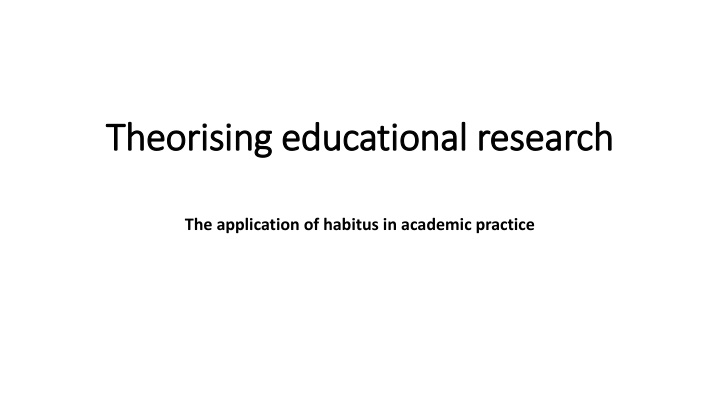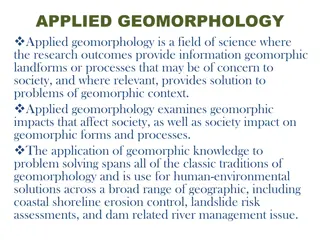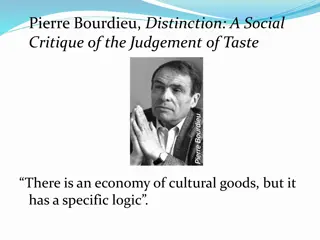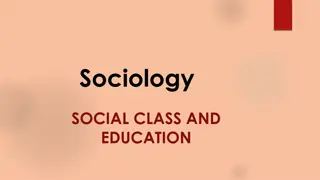
Habitus in Educational Research: The Application and Implications
Dive into the exploration of habitus in academic practices, its impact on scholarly behaviors, and the intersection with digital scholarship. Discover how Pierre Bourdieu's theory of habitus shapes educational research and the transformation within academic communities.
Uploaded on | 2 Views
Download Presentation

Please find below an Image/Link to download the presentation.
The content on the website is provided AS IS for your information and personal use only. It may not be sold, licensed, or shared on other websites without obtaining consent from the author. If you encounter any issues during the download, it is possible that the publisher has removed the file from their server.
You are allowed to download the files provided on this website for personal or commercial use, subject to the condition that they are used lawfully. All files are the property of their respective owners.
The content on the website is provided AS IS for your information and personal use only. It may not be sold, licensed, or shared on other websites without obtaining consent from the author.
E N D
Presentation Transcript
Theorising educational research Theorising educational research The application of habitus in academic practice
First step First step Know your field of research well! Read! Read! Read! And question!
Find a focus Find a focus Looking at the change of scholarly practices with technology
Digital scholarship practices. Adapted from Weller (2011), pp. 59.
Find a focus Find a focus Academics fighting for a new habitus Looking at the change of scholarly practices with technology What are practices? Operationalising dispositions (which ones?) to capture habitus (which method?)
Habitus Applied: Pierre Bourdieu and Social Theory
Habitus Habitus Mental structures inscribed in the body represented (and externalised) by individuals dispositions the habitus exploits the body s readiness to take seriously the performative magic of the social (Bourdieu, 1990, p. 57)
Habitus Habitus a system of dispositions with a past, present, and a future The notion of habitus has several virtues. ( ) agents have a history and are the product of an individual history and an education associated with a milieu, and that they are also a product of a collective history, and that, in particular, their categories of thinking, categories of understanding, patterns of perception, systems of values, and so on, are the product of the incorporation of social structures (Bourdieu and Chartier, 2015, p.52)
Habitus Habitus a system of dispositions with a past, present, and a future
Habitus Habitus Durable and transposable Transformative and regenerative Dispositions Primary habitus Secondary habitus
Through which mechanisms can we apply apply and conceptualise conceptualise habitus as part of the research process?
In Outline of a Theory of Practice, Bourdieu defends the flexibility of the research process as a form of challenging assumptions and rectifying taken for granted conceptions.
Narrative inquiry Accessing personal trajectories the longitudinal and lateral aspects of practices through reflective action Knowledge does not merely depend ( ) on a particular standpoint an observer situated in space and time takes up on the object. The knowing subject ( ) constitutes practical activity as an object of observation and analysis, a representation (Bourdieu, 1977, p. 2).
The ontological and epistemological difference between their digital dispositions and their academic position encourages the discursive reflection of established practices as explicit criticism of dominating norms (Costa, 2015).
Dispositions as a representation of habitus can be regarded as a tacit understanding of the field Crisis of meaning makes a (changing) habitus explicit
If habitusjustifies and produces social actions and practices, then it must also account for change the habitus makes possible the free production of all the thoughts, perceptions and actions inherent in the particular conditions of its production and only those (Bourdieu, 1990, p.55)
Knowledge does not merely depend () on a particular standpoint an observer situated in space and time takes up on the object. The knowing subject ( ) constitutes practical activity as an object of observation and analysis, a representation (Bourdieu, 1977, p. 2).
Bourdieu, habitus and social research: The art of application (Costa and Murphy, 2015)






















